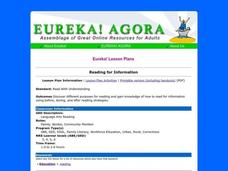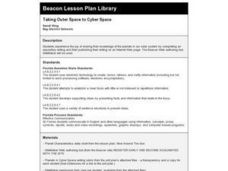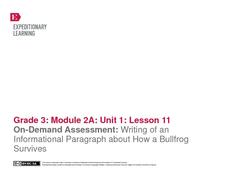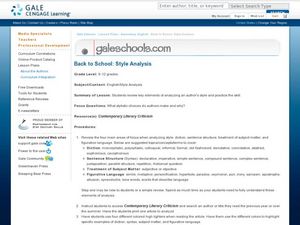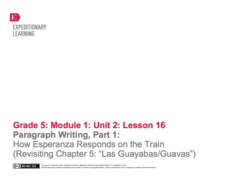Curated OER
Comprehension: Create a Summary from an Expository Text
Children can learn to analyze expository or informational texts at nearly any age. This scaffolded and scripted resource provides teachers with the support needed to facilitate a thoughtful lesson plan on summarizing informational text...
Read Works
Signal Words in Expository Text
Signal words are one way that authors make the relationships between their ideas clear. Allow your learners the chance to investigate cause and effect in texts by identifying signal words. They locate and analyze cause-and-effect...
EngageNY
Close Reading of Bullfrog at Magnolia Circle: Main Ideas about the Bullfrog
As your class reaches the end of the book Bullfrog at Magnolia Circle, the seventh lesson in this literary unit helps third graders transition from reading narrative to expository writing. Scholars develop their note-taking skills as...
Curated OER
Reading for Information
What should readers do to prepare for reading an informational text? What should they do during their reading? What should they do after completing such a text? Introduce your pupils to reading strategies and techniques to gain meaning...
Curated OER
Narrative vs. Expository Texts
Young scholars use examples of narrative and expository text to analyze and compare the two styles. Students read articles on life in Lesotho and Madagascar and use graphic organizers and discussion to compare them. Young scholars write...
Curated OER
Writing Process- Expository Writing
Expository writing is the focus of the language arts lesson presented here. In it, young writers review what expository writing is through a class discussion and teacher demonstration. Then, learners write expository text that describes...
Curated OER
Charlotte's Web
Fourth graders focus on fluency by reading the book Charlotte's Web. In this reading strategies instructional activity, 4th graders partner read, do guided reading, and independent reading to increase fluency. Students use Venn Diagrams,...
Curated OER
Talking Heads
After processing notes from research or an interview, middle schoolers turn the information into a script or dialogue for narrative, persuasive, or expository text. Use this lesson in any writing unit to reinforce proper writing skills.
West Contra Costa Unified School District
Expository Writing in Math
Pupils engage in an activity where one partner reads directions while the other follows those directions to complete a math task (such as bisecting an angle). As a reflection, they examine products to see what information the best...
Curated OER
Taking Outer Space to Cyber Space
Use the Internet, write an expository text, and have students share their knowledge of the planets in our solar system. They compose an expository writing piece and publish it to a web page.
Curated OER
Cooperative Classroom Text Features Activities
Fifth graders examine text features and create a PowerPoint presentation. In this text features lesson, 5th graders go over Kagan Cooperative Learning Structures and text features before they choose one to include in a book and...
Curated OER
Only the Facts
Practice the strategy of summarizing to gain meaning and knowledge from an informational text. Young readers highlight supporting details and main ideas, and then they use this to summarize two articles: "The Great Quake" and "What is an...
National Math + Science Initative
Reading an Informational Text: "It All Started with Sputnik"
Sputnik was one of the greatest scientific advancements of the 1950s, and this reading lesson does it justice. Pupils start off with pre-reading questions and a video. They then read an excerpt from an article, which is accompanied by...
Curated OER
Water Cycle Reading and Writing
Here is a great way to get pupils to express a scientific concept in a fun way. After hearing the story of Walter the Water drop and learning facts about the water cycle, the class will write a creative expository piece describing what...
Curated OER
Identifying Setting: Expository Writing
Your class can take turns describing a well know location or setting without giving its name, and the rest of the class can try to identify the location, based on the details given. They chart the elements that helped in the...
EngageNY
Close Reading: Paragraphs 2 and 3 of “Refugee and Immigrant Children: A Comparison” and Introducing the NYS Expository Writing Rubric
What factors make adaptation successful for refugee and immigrant children? The class explores the topic by reading two paragraphs from "Refugee and Immigrant Children: A Comparison." Next, they engage in a think-pair-share to discuss...
EngageNY
On-Demand Assessment: Writing of an Information Paragraph About How a Bullfrog Survives
Having read and discussed Bullfrog at Magnolia Circle, third graders demonstrate their bullfrog expertise by writing informational paragraphs. Building on the note-taking and paragraph planning from the previous lesson plan, learners...
EngageNY
Grade 9 ELA Module 3, Unit 3, Lesson 3
Plagiarism is the theft of intellectual property. To avoid this crime, class members learn how to create a works cited page and how to craft in-text citations. After examining a high-performance model paragraph and an example of a works...
EngageNY
Research: Identifying Categories for Our Research About the Wheelwright
Here is a fine instructional activity on reading and understanding expository text designed for 4th graders. With a partner, learners read a passage of text about a machine called a wheelright. This machine was commonly used in the...
Curated OER
Reading For Information
To help learners better comprehend informational texts, they work through a series of activities. They discuss strategies, make predictions, skim passages, focus on key words, and practice taking notes. This lesson focuses on what to do...
EngageNY
End of Unit 2 Assessment, Part One: First Draft of Analysis Essay
How do writers use evidence from literary texts to support analysis and reflection? With instructional activity 17 of 20 from the Grade 8 ELA Module 1, Unit 2 series, learners gather resources to prepare for an end-of-unit assessment....
Curated OER
Back to School: Style Analysis
Jump back into expository writing and analysis at the start of a new school year! Start with a review of an authors' stylistic choices in diction, syntax, treatment of subject matter, and figurative language. Writers choose a text to...
Curated OER
Hic-Hic-Hooray!
What is really the best way to get rid of hiccups? Investigate some old wives' tales and folk remedies related to health. Middle schoolers explore the science behind why people might believe these myths to be true and find the real...
EngageNY
Paragraph Writing, Part 1: How Esperanza Responds on the Train (Revisiting Chapter 5: "Las Guayabas/Guavas")
When your class members have completed the novel Esperanza Rising, they will be ready to write an expository essay on how Esperanza responds to events and what this says about her character. Set your pupils up for success by starting out...
Other popular searches
- Expository Text Structures
- Reading Expository Text
- Expository Texts Examples
- Expository Text Features
- Expository Text Lesson Plans
- Vocabulary, Expository Text
- Examples of Expository Texts
- Summarizing Expository Texts
- Identifying Expository Texts
- Vocabulary Expository Text
- Teaching Expository Texts





